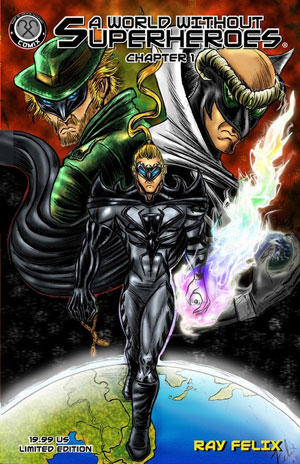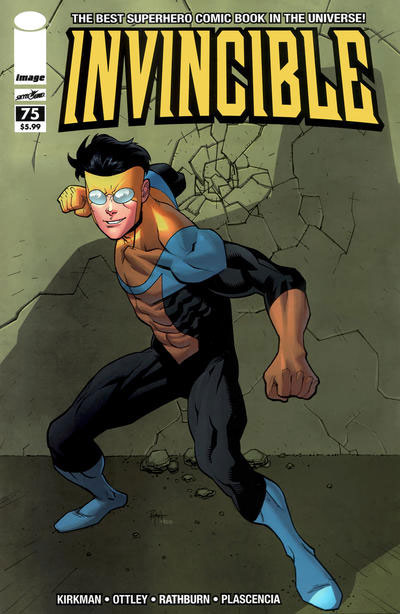A World Without “Superhero” Trademarks
So here’s the latest thing to irritate me about the comics biz.
There’s this little publisher called Cup O’ Java Studio Comix that’s been working on a comic called “A World Without Superheroes.” And Marvel and DC are going to take ’em to court because of their jointly-held trademark of the word “super hero.” (or superhero or super-hero or whatever variation.) They’ve done this before — a few years back, there was a comic called “Super Hero Happy Hour,” which changed its name to “Hero Happy Hour” to keep from getting sued.
I think this is all fairly silly, and I hope, since it appears that Cup o’ Java is willing to take it to court, that this is going to spell the end of the Marvel/DC trademark of “superhero.”
Ya see, the thing with trademarks is that you have to keep them protected. That means keeping track of people who may be using your trademark and getting them to stop. ‘Cause if you don’t, you run the risk of a court saying you haven’t done anything to protect your trademark, so anyone can use it. Or worse, from a business viewpoint, if your trademark gets used too often as a generic replacement for any variation of a product or service you provide, even if it’s actually offered by one of your competitors.
Let’s take this slow. Some companies take trademark enforcement way too seriously — McDonald’s, for instance, sues just about anyone who has a “McDonald” in their business name. McDonald Dry Cleaning, McDonald Lawn Care, McDonald Chainsaw Repair. That’s just mean, ’cause no one is going to assume that the same company that makes Big Macs is also going to fix your chainsaw, right? Too many lawsuits for frivolous reasons just makes people mad at you and gets you a reputation as a bully.
On the other hand, you really do have to make sure you don’t let your name become too generic. Xerox has had that trouble for years, because people started using their name as a verb — “I’m going to go xerox my files” when they meant they were just going to go make some copies. Xerox has worked hard for years, usually through advertising and public relations, to remind people that Xerox is a trademark, not just another word for photocopies. Same thing with Wham-O, which is so on the ball about protecting their trademark on the Frisbee that when you search on Wikipedia for “Frisbee,” it automatically redirects you to the article for “flying disc.” I mean, as far as I can tell, there’s no Wikipedia article at all for the Frisbee product, ’cause they’re so focused on making sure people remember it’s a Frisbee(R) flying disc.
There’s a whole branch of trademark law that has to do with generic trademarks — common words that used to be trademarks, like aspirin, zipper, kerosene, escalator, yo-yo, even heroin.
And let’s be honest now — “superhero” is a completely generic term. It describes Superman, Batman, Wonder Woman, Spider-Man, Storm, and Iron Man. But it also describes Spawn, the Tick, the Incredibles, Danny Phantom, the Powerpuff Girls, Fantomah, and every player character in the “City of Heroes” and “Champions Online” computer games. Your kid runs around with a bath towel around his neck and a paper domino mask, and who is he? He’s a superhero. Lower-case. Commonplace. Generic.
In “The Incredibles,” Bob Parr says, “Of course I have a secret identity. I don’t know a single superhero who doesn’t.”
In “Hancock,” Mary Embrey says, “Gods, angels… Different cultures call us by different names. Now all of a sudden it’s superhero.”
In “The Greatest American Hero,” Ralph Hinkley says, “I’m not quitting my job. How am I supposed to eat? Go down to the welfare office and stand in the superhero line?”
Did Marvel and DC sue to protect their trademarks in any of these instances? ‘Cause if Xerox had to deal with a lot of movies and TV shows using their trademark so carelessly, they’d raise hell, I guarantee. Why do DC and Marvel let this stuff slide?
Have they complained over the last few years about the tagline on the “Invincible” comics?
“The Best Superhero Comic Book in the Universe!” They’re even cribbing the Fantastic Four’s tagline, and Marvel didn’t say boo about it.
The fact is, Marvel and DC only try to enforce their trademark when it’s a small publisher that doesn’t have the money to fight them in court. And while that’s a great strategy for winning court cases, it’s not a good strategy to use when you want to really protect your trademark. Because everyone else uses it so much, it’s now completely generic. They don’t try to protect it when Image or Pixar use it or even book publishers who publish books with the word “superhero” in their titles. It’s almost like they know they’ve got a phony-baloney trademark, and they don’t want to draw too much attention to it.
Letting Marvel and DC have a trademark on “superhero” is about as stupid as letting Tor have a trademark for “science fiction,” or Universal Studios have one for “movie,” or Safeway have one for “groceries.” That’s not just my fat-guy schmuckass opinion either — legal experts generally think it’s kinda loopy that Marvel and DC — two competing companies — were ever allowed to share a trademark on such a generic term anyway.
“Superhero” belongs to all of us. And DC and Marvel can’t put that genie back into the bottle.



Voodoo Ben Said,
February 4, 2013 @ 9:17 am
This is, in all seriousness, one of the best articles you’ve written, and definitely the best op ed piece I’ve read on this subject.
scottslemmons Said,
February 4, 2013 @ 9:27 am
Yay! (claps hands and dances in delight)
Oh, wait, I should look more professional. (smokes bubble pipe)
Seriously, thanks, and I’m glad you liked it. 🙂
Richard Bensam Said,
February 4, 2013 @ 8:29 pm
You got it right: they only go after targets too small to fight back. And Marvel and DC are the companies who publish stories about “heroes.” Where they get their nerve is beyond me.
They’ve been at this for a long time: I know for a fact they looked into suing Troma over The Toxic Avenger back in 1984, because the poster art referred to the character as a superhero. They ended up publishing a comic about him a few years later. Perhaps it was because the film’s profits made the producers big enough to fight back?
Chace Thibodeaux Said,
June 1, 2013 @ 2:21 pm
Great post, I agree completely. I hope DC and Marvel lose this, it’s totally bogus.
scottslemmons Said,
June 1, 2013 @ 2:37 pm
Thanks, Chace — it’s just nuts that DC and Marvel do stuff like this. It’s irritating enough that they hold a bogus trademark like this, but it’s even worse when they use their lawyers to abuse smaller publishers, just for the crime of not having DC’s and Marvel’s legal budget…